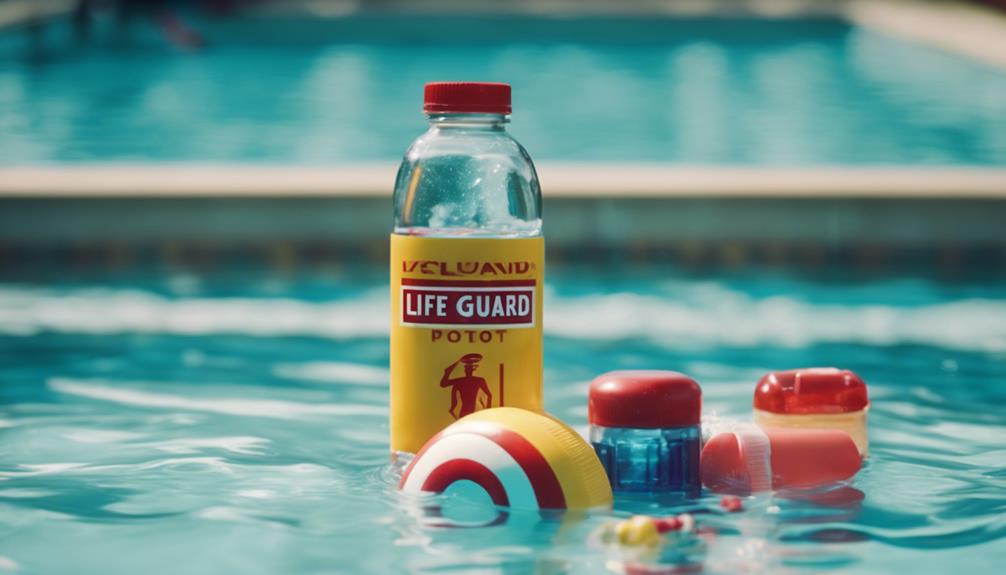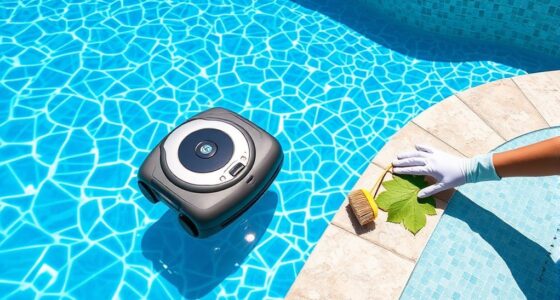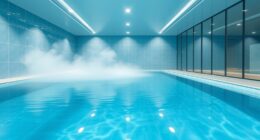Ensure your pool’s safety by avoiding household cleaning products such as bleach, which can produce harmful gases. Over-chlorination can cause skin irritation and damage pool surfaces, so be sure to regularly test for proper balance. Never mix pool chemicals together to prevent dangerous reactions, and refrain from using petroleum jelly on o-rings to preserve their integrity. Neglecting water maintenance can result in cloudy or algae-filled pools, posing risks to swimmers. Be aware of strong chemical odors, as they may indicate a chlorine imbalance. Proper pool care is essential for a safe swimming environment. Find out more about maintaining cleanliness and safety in your pool to enhance your overall experience.
Key Takeaways
- Avoid household cleaning products in the pool to prevent dangerous gases and skin irritation.
- Over-chlorinating leads to skin irritation, equipment damage, and asthma aggravation.
- Never mix pool chemicals to prevent toxic fumes and equipment corrosion.
- Petroleum jelly harms o-rings; use silicone or teflon lubricants for maintenance.
- Neglecting pool water maintenance causes algae, cloudy water, and health hazards.
Household Cleaning Products
Avoid using household cleaning products in your swimming pool to prevent harmful reactions and maintain water quality. Mixing these products with pool chemicals can lead to the formation of dangerous gases, putting your health at risk.
Ingredients like ammonia and bleach found in many cleaners can cause skin and eye irritation when introduced into pool water. Not only can household cleaning products disrupt the chemical balance of your pool, but they can also damage the pool equipment over time.
By keeping these products out of your pool, you're ensuring a safer and cleaner swimming environment for yourself and your family. Remember, it's best to stick to pool-specific chemicals and cleaners to avoid any unwanted reactions or health hazards.
Prioritizing the proper maintenance of your pool will help you enjoy it for years to come without any unnecessary risks.
Over-chlorinating the Pool

Monitoring chlorine levels carefully and refraining from over-chlorinating the pool is vital to prevent detrimental effects on both swimmers and the pool itself. Excessive chlorine levels from over-chlorination can lead to skin irritation and worsen asthma symptoms, making the swimming experience uncomfortable and potentially harmful. Additionally, high chlorine levels can damage pool equipment and surfaces, causing long-term maintenance issues that can be costly to repair. To avoid these problems, it's important to pay close attention to chlorine levels and avoid over-chlorination.
One way to prevent over-chlorination is by combining small amounts of chlorine with ionizers, which can help reduce the need for excessive chlorine usage while still maintaining water quality. Regular water testing is also important to make sure that chlorine levels are within the recommended range.
Mixing Different Pool Chemicals

Mixing different pool chemicals can be extremely dangerous due to the risks of chemical incompatibility. This can lead to the formation of toxic fumes that pose serious health hazards.
Additionally, improper chemical combinations can cause equipment damage, skin irritation, and other harmful effects.
Chemical Compatibility Risks
Mingling various pool chemicals without proper knowledge of their compatibility can result in hazardous outcomes such as toxic fumes, explosions, or fires.
When it comes to your pool, chlorine is a common chemical used for sanitation. However, mixing chlorine with acids like muriatic acid can release harmful chlorine gas, leading to respiratory issues.
Additionally, adding shock, which contains calcium hypochlorite, to a chlorine-based pool can trigger dangerous reactions, potentially causing explosions.
It's essential to never mix chlorine with other chemicals such as ammonia or vinegar as this can produce toxic chloramine gases.
Understanding the compatibility of pool chemicals is vital for preventing accidents, injuries, and damage to pool equipment. Always read and follow the instructions on chemical labels carefully to guarantee safe handling and usage.
Dangerous Fumes Potential
Properly handling and storing pool chemicals is crucial to prevent the creation of dangerous fumes through their inadvertent combination. When pool owners mix different pool chemicals, they risk exposing themselves to harmful fumes that can lead to serious health issues. Here are some essential points to take into account regarding the potential dangers of mixing pool chemicals:
- Toxic Gas Release: Mixing chlorine with acids can result in the release of toxic gases like chlorine gas, which can cause respiratory problems and skin irritation.
- Chloramine Gas Formation: Combining chlorine with ammonia-based cleaners can create chloramine gas, leading to respiratory issues and eye irritation.
- Chemical Burns: Improper mixing of pool chemicals can cause chemical burns on the skin, eye irritation, and other skin reactions.
- Prevention Measures: Always follow proper guidelines for handling and storing pool chemicals to minimize the risk of accidental mixing and exposure to dangerous fumes. Be cautious when handling chemicals around the pool area to ensure safety for yourself and others.
Equipment Damage Caution
When handling pool chemicals, be mindful of the potential for equipment damage if different chemicals are inadvertently combined. Mixing various pool chemicals can lead to dangerous chemical reactions that not only pose risks to swimmers but also harm your pool equipment.
Combining chlorine with other chemicals, for instance, can create toxic fumes, damage pool surfaces, and corrode metal parts of your equipment. These reactions may result in costly repairs and replacements, impacting your Pool Maintenance routine and compromising pool safety.
To keep your pool safe and avoid equipment damage, make sure to always follow manufacturer guidelines when handling and mixing pool chemicals. Avoid experimenting with different chemical combinations, as improper mixing can lead to explosions, fires, or the release of hazardous gases.
Using Petroleum Jelly on O-rings

Using petroleum jelly on o-rings may seem like a quick fix, but it can actually harm your pool equipment. Petroleum-based products can break down the o-ring material over time, leading to leaks or equipment malfunctions.
Consider using silicone or teflon lubricants instead to maintain the longevity and effectiveness of your o-rings.
O-Ring Damage Risks
To prevent O-ring damage risks, avoid applying petroleum jelly on O-rings in your swimming pool equipment. Using Vaseline can lead to O-rings breaking down and becoming ineffective over time. Instead, opt for lubricants made of silicon or teflon for proper O-ring maintenance. Here are some reasons why petroleum-based products should be avoided:
- Breakdown:
Petroleum products can cause O-rings to stretch, tear, and deteriorate, affecting the performance of your pool equipment.
- Seal Integrity:
O-rings exposed to petroleum-based substances may lose their ability to create a proper seal, leading to leaks and potential water damage.
- Longevity:
Lubricants like silicon or teflon are more suitable for O-rings, ensuring longevity and efficient functioning of your pool equipment.
- Prevention:
Avoiding petroleum-based products like Vaseline is essential to prevent damage and maintain the integrity of your pool equipment.
Alternative Lubrication Methods
Avoid jeopardizing the longevity and effectiveness of your pool equipment by refraining from using petroleum jelly, such as Vaseline, on O-rings. Pool o-rings play a vital role in maintaining a watertight seal in various components of your pool system.
When it comes to lubrication, steer clear of petroleum-based products like Vaseline. These substances can have harmful effects on o-rings, causing them to deteriorate, stretch, tear, or lose their functionality over time. To guarantee the excellent performance of your pool equipment, opt for lubricants specifically designed for pool maintenance, such as silicon or teflon-based products.
These alternatives provide the necessary lubrication without compromising the integrity of the o-rings. By avoiding petroleum-based lubricants, you can help prolong the lifespan of your pool equipment and prevent unnecessary wear and tear on essential components. Make a wise choice in lubricants to safeguard the efficiency and durability of your pool system.
Neglecting Pool Water Maintenance

Neglecting proper maintenance of your pool water can lead to a host of issues that compromise both the water quality and the overall swimming experience. Here are some reasons why neglecting pool water maintenance is a bad idea:
- Algae Growth: Without proper care, your pool water can quickly turn green with algae, making it unappealing and potentially harmful to swimmers.
- Cloudy Water: Neglecting maintenance can result in cloudy water, reducing visibility and indicating a lack of cleanliness.
- Bacterial Contamination: Failure to maintain water balance can lead to the growth of harmful bacteria, posing health risks such as skin irritation and infections.
- Equipment Damage: Ignoring regular maintenance tasks can damage your pool equipment, leading to costly repairs and potentially shortening the lifespan of your pool.
Pool Water With Strong Chemical Smell

Experiencing a strong chemical smell in your pool water signals an important imbalance in chlorine levels that may cause skin irritation and eye irritation. This smell often stems from the formation of excessive chloramines, which result from chlorine interacting with contaminants in the water.
High levels of combined chlorine not only lead to skin and eye irritation but can also contribute to respiratory issues and poor air quality around the pool. To address this issue, it's vital to regularly test and maintain proper water balance in your pool.
Frequently Asked Questions
What Not to Put in a Swimming Pool?
When it comes to what not to put in a swimming pool, remember to avoid substances like metallic elemental sodium, hydrocarbons, fertilizers, gasoline, and topsoil. Using these can lead to dangerous reactions, damage, and water quality issues.
What Is Forbidden in Most Swimming Pools?
You don't want to be that person who ruins the pool vibe. Keep out metallic sodium, gasoline, hydrocarbons, fertilizers, and topsoil. Sabotaging with oil? Not cool. Let's keep the water clean, okay?
What Is Not Allowed in a Swimming Pool?
You should never introduce substances like metallic sodium, gasoline, topsoil, oil, or unsafe dyes into a swimming pool. These can lead to serious maintenance issues, contamination, and safety hazards, jeopardizing the pool's health and cleanliness.
What Ruins a Pool Liner?
To ruin a pool liner, steer clear of gasoline, oil, harmful substances, dye, and cement. Overusing sequestrants can also spell trouble. Mishandling these items can lead to costly repairs and major headaches down the line.
What Are Some of the Worst Things That Should Not Be Added to a Swimming Pool?
When considering adding swimming pool chemicals safely, it’s vital to avoid certain substances. Adding excessive amounts of chlorine or other harsh chemicals can be harmful. Additionally, oils, lotions, and other personal care products should not be introduced into the pool, as they can create a murky and unsanitary environment.
Conclusion
To maintain your swimming pool safe and enjoyable, avoid putting household cleaning products, over-chlorinating the pool, mixing different pool chemicals, using petroleum jelly on O-rings, neglecting pool water maintenance, and letting the pool water develop a strong chemical smell.
By following these guidelines, you can guarantee that your pool remains a rejuvenating and relaxing retreat for you and your family to enjoy. Remember, a little prevention goes a long way in maintaining a clean and healthy swimming environment.










